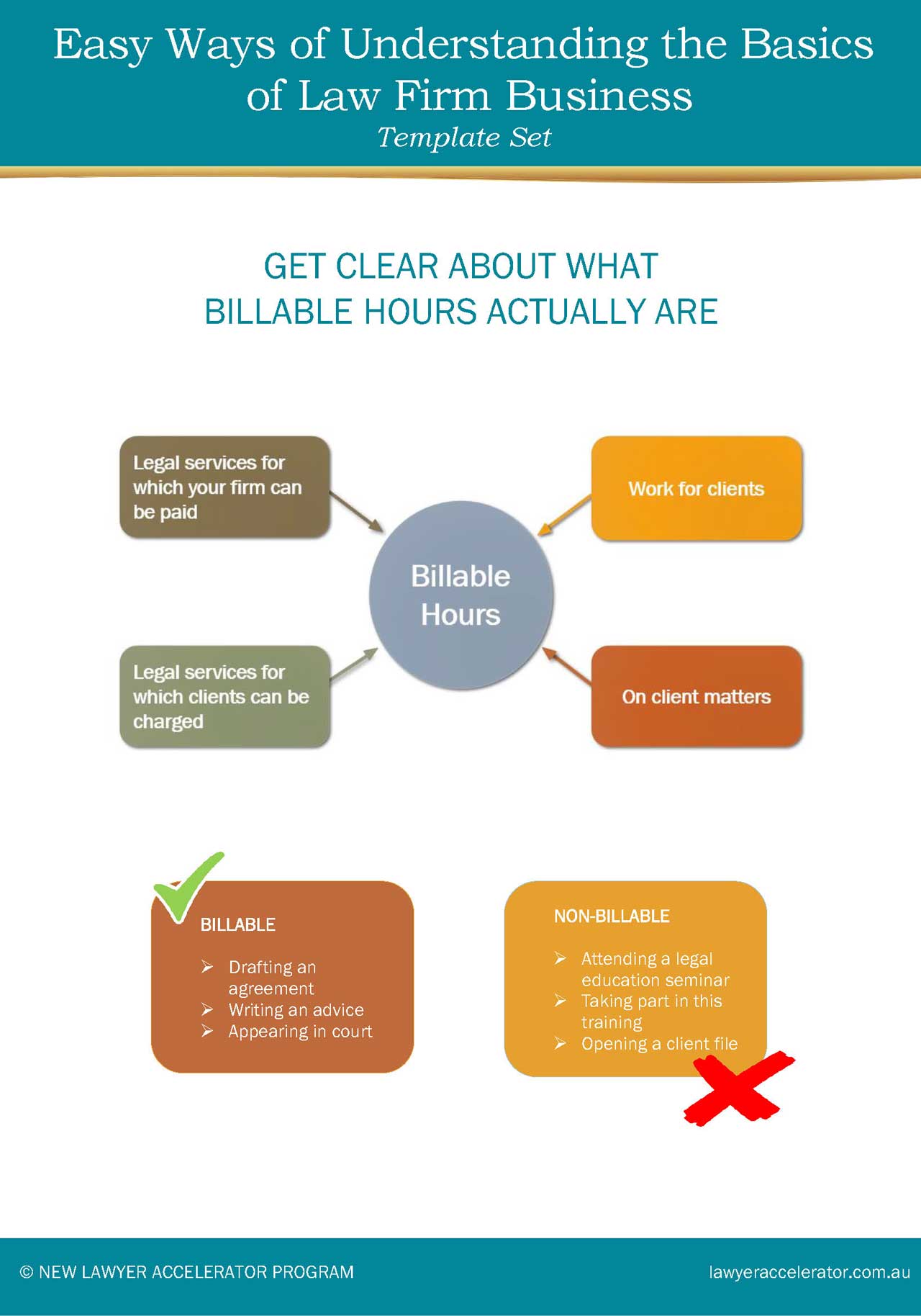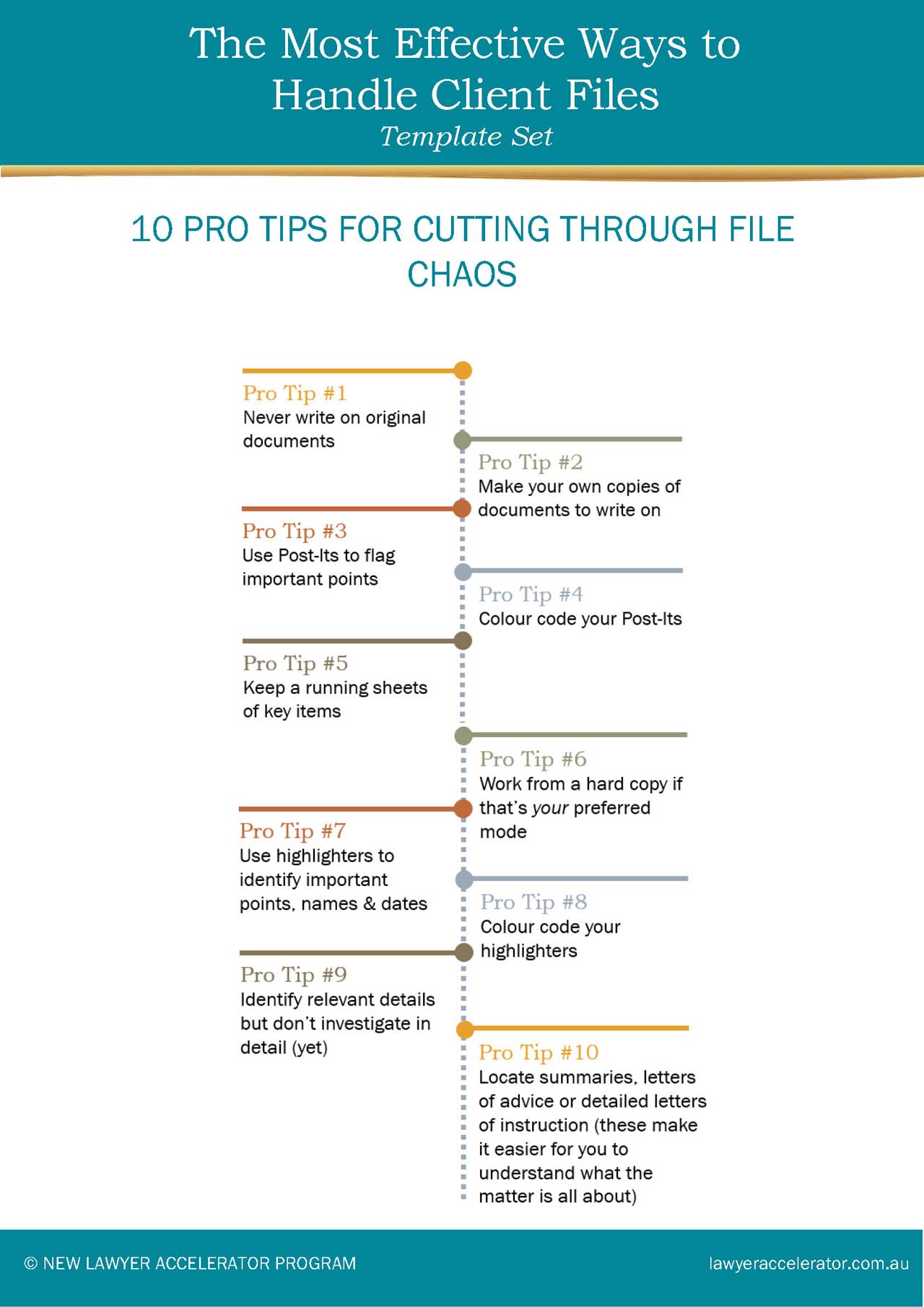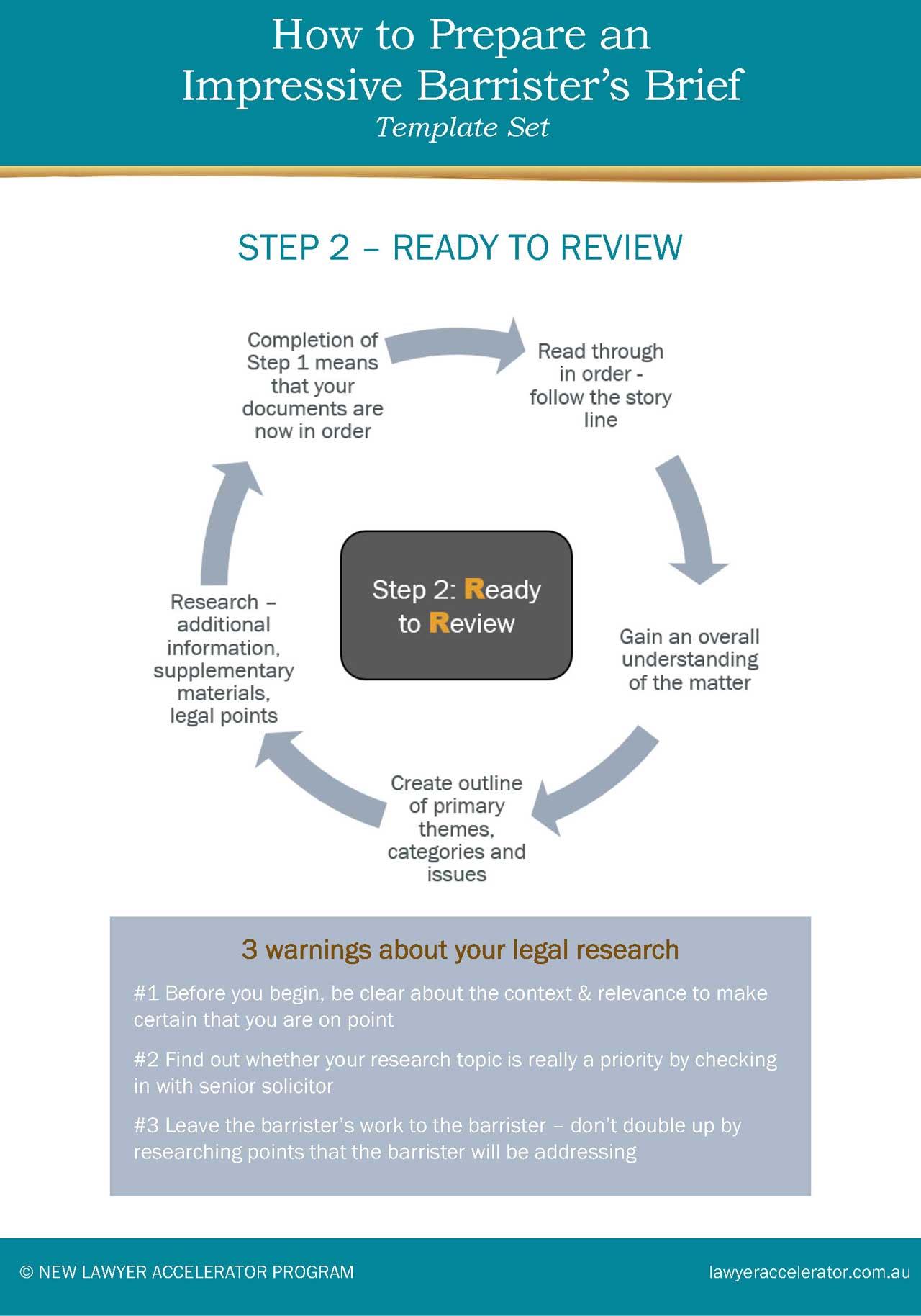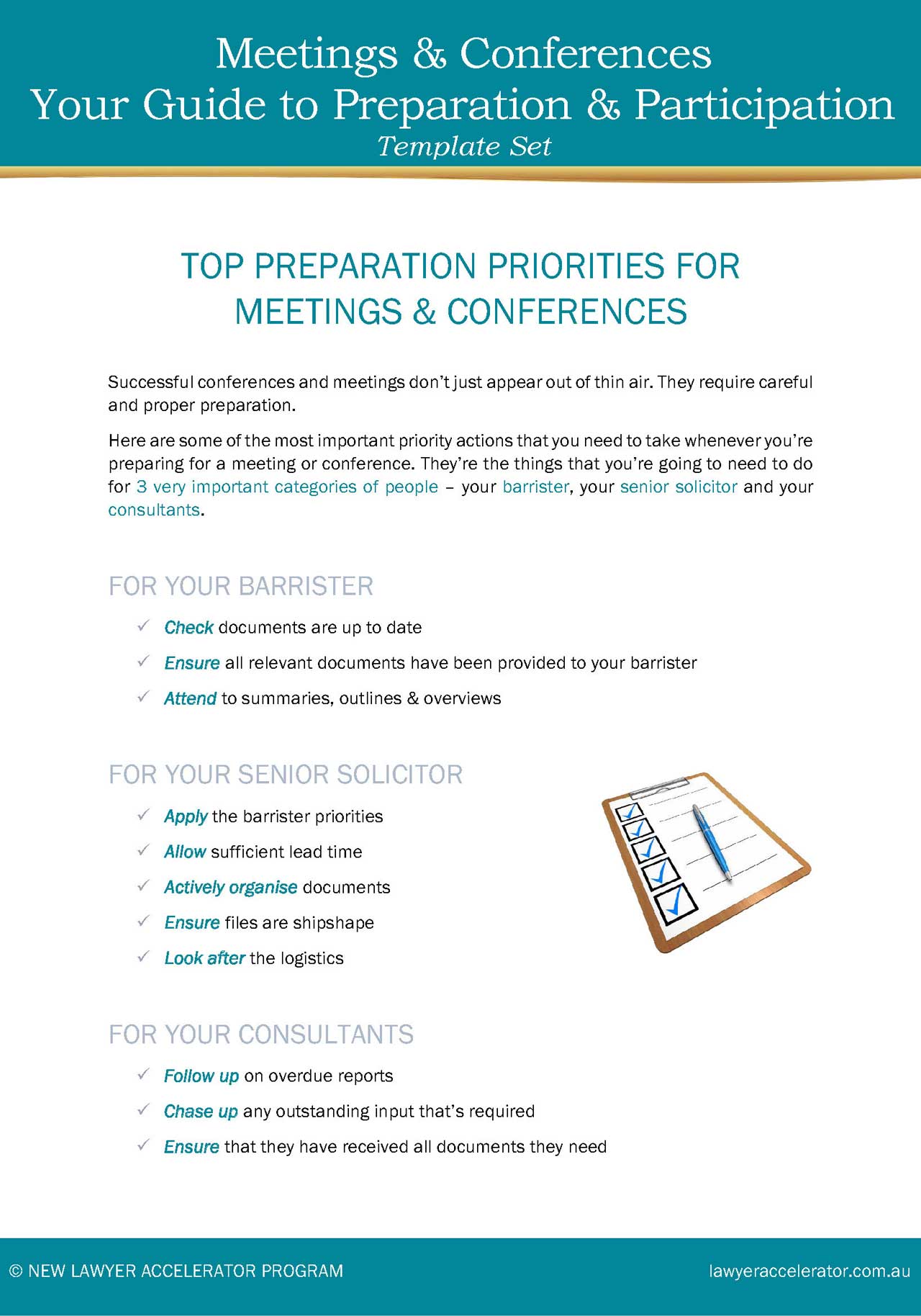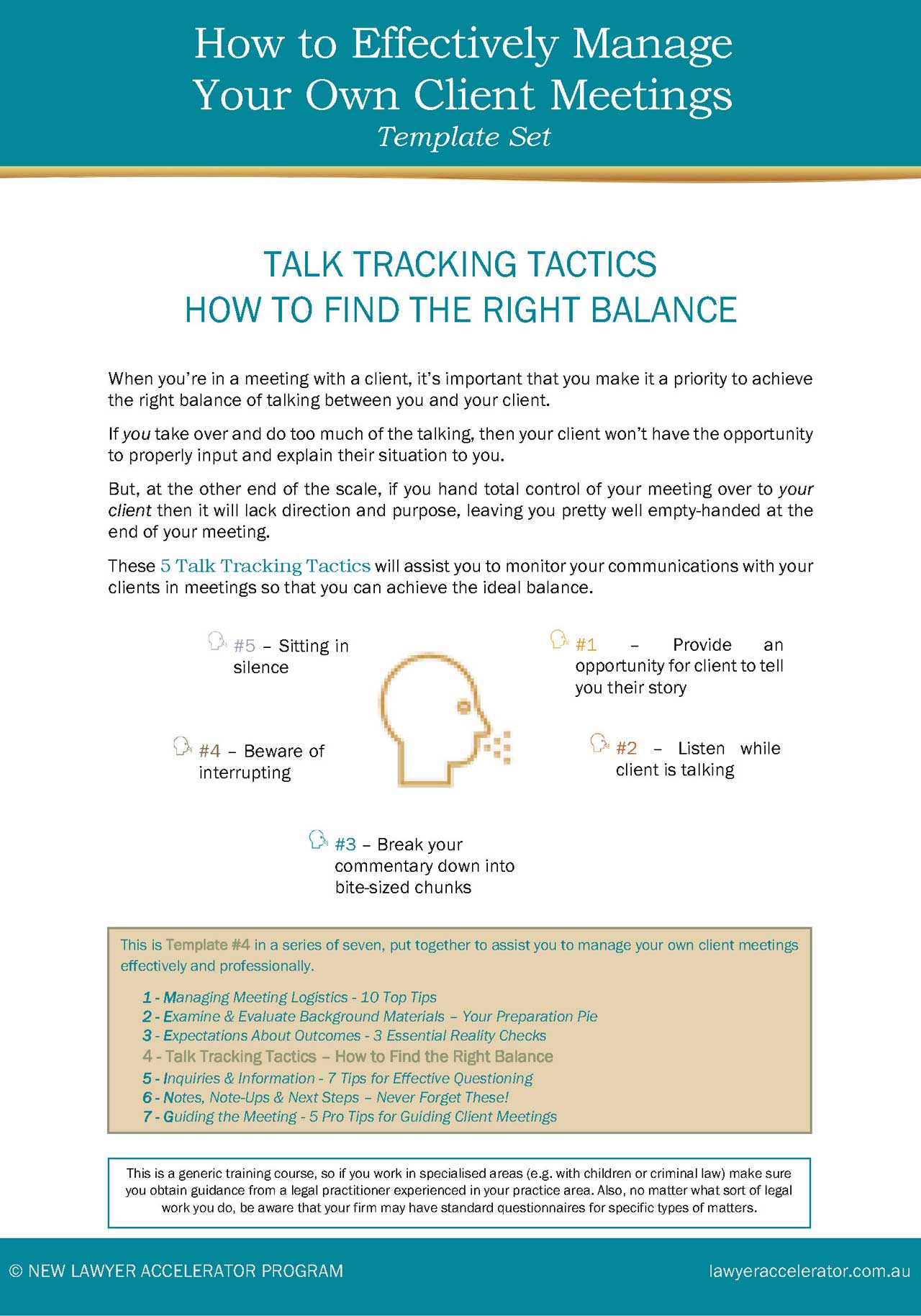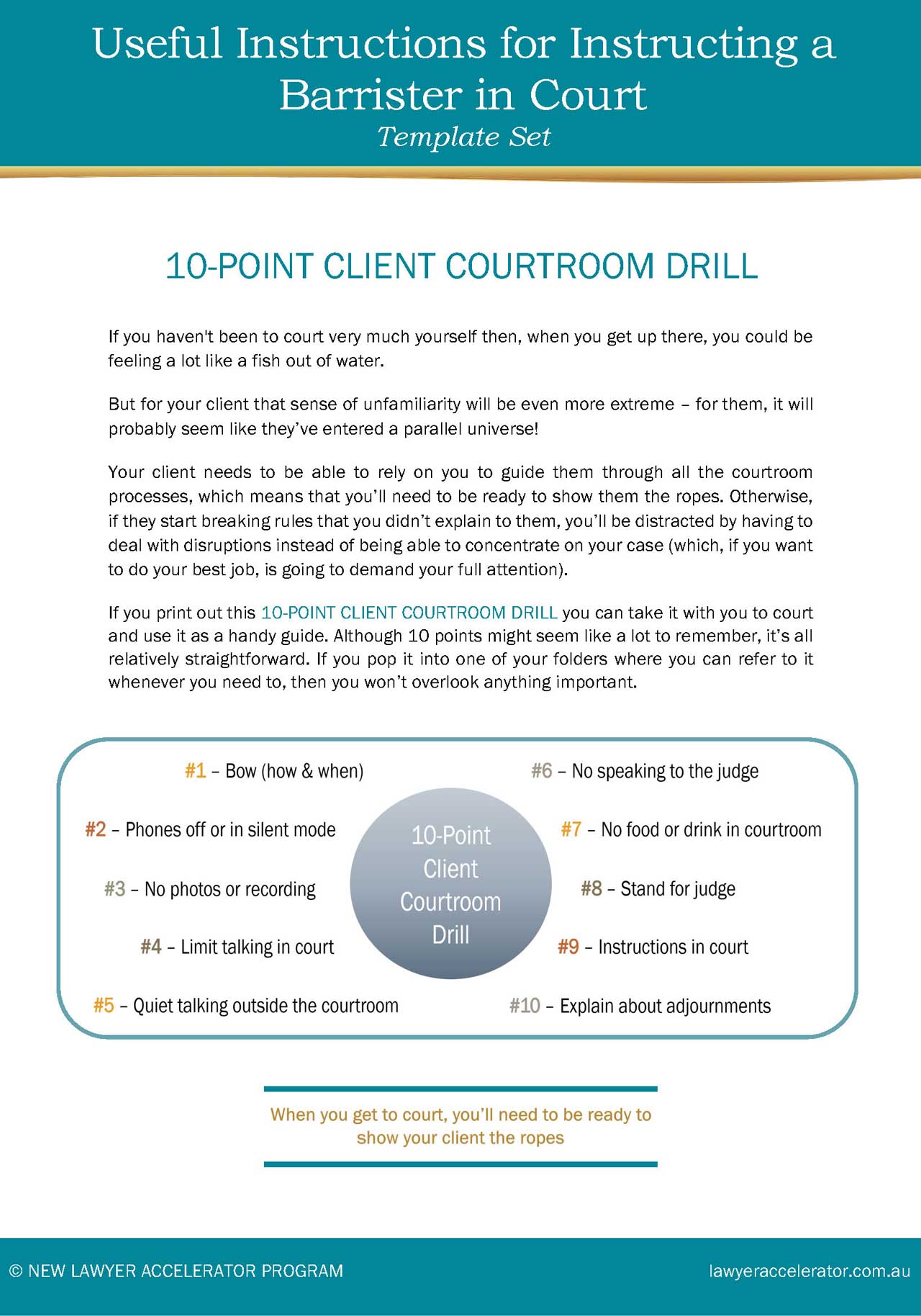The New Lawyer Accelerator Program

Eliminate guesswork, reduce errors and improve productivity
Lack of experience means that until new starters have been trained in essential practical skills, learning curve drags on, mistakes are made, and progress is slow. But in amongst all the demands of a busy legal practice, these bottom-line basics can easily be overlooked, forgotten or pushed down the priority list because there just aren’t enough hours in your day. Which means that graduates frequently resort to guesswork, trial and error and risky choices.
Now, there’s an easy way for you to avoid the pitfalls of these training constraints, with the New Lawyer Accelerator Program.
The New Lawyer Accelerator Program is a comprehensive training course, focused exclusively on teaching entry-level practical legal skills to new lawyers.
Through a series of innovative videos, the New Lawyer Accelerator Program delivers over 20 hours of specialist legal practical skills training all specifically selected to match the entry level of a new lawyer.
Graduates are guided through a carefully structured training sequence as they’re shown how to correctly undertake the typical ‘everyday’ tasks of a junior lawyer.
Including induction sessions to familiarize graduates with general law firm protocols like budgets, client file procedures and completing timesheets, each module is packed full of straightforward explanations, real-life examples and practical tips as your new lawyer is guided, step-by-step through essential basic skillsets like these and more:
- How to complete time sheets correctly; keeping track of billable hours & budgets
- The process to follow for preparing a brief to a barrister
- Organising, preparing for and attending meetings and conferences
- Opening and closing client files; taking files home; using original documents
- Practical tips for preparing for a court appearance or instructing a barrister in court
- How to handle telephone inquiries; taking instructions; communicating with clients
- Prioritising workload demands; how to organize information; working on your own
Plus, there are quizzes, checklists, precedents, guides, summaries to reinforce everything that’s learnt, so that graduates have the tools they’ll need to be able to perform at their best in your practice efficiently and effectively from the very start.
Frequently Asked Questions
The New Lawyer Accelerator Program has been specifically designed for newly admitted lawyers who are just beginning their career. It is suitable for very junior lawyers, so that instead of making mistakes and learning through trial and error they’ll have the opportunity to accelerate their way through the unavoidable learning curve of their first year in legal practice.
It is totally focused on the day-to-day practical skills that junior lawyers need to know in order to be able to carry out their legal work effectively and professionally.
The training begins with a basic level of practical skills to match the daily sorts of tasks that a newly admitted lawyer will be undertaking when they first join a law firm, and then builds on and adds to those skills throughout the program.
The ideal time is right from day one so that new lawyers can benefit from the initial induction modules. In these, they find out straightaway how a law firm functions on a day-to-day level (organising their workspace, WHS issues, office logistics), understand important administrative procedures (like file opening, document management and budgets) and have a chance to adjust to all the unfamiliar protocols (for instance, use of technology and personal devices, appropriate dress standards and time recording). Then they start on the sorts of typical tasks that they’ll be assigned when they first begin in a law firm (including taking telephone inquiries, preparing barrister briefs, organising meetings and conferences, court appearances, taking instructions and more).
Since there’s so many things to learn, any time is a good time for a new lawyer to take part in the New Lawyer Accelerator Program.
This comprehensive program delivers 20 hours of specialist video training, each dealing with a topic that directly relates to the daily work of a newly admitted lawyer. The optimum training format is one hour a day, and then to immediately apply what’s been learnt as you go.
The training is ‘hands-on’ and uses realistic, everyday situations as examples which are broken down with step-by-step explanations. The videos are structured in a clear, plain and simple format, with engaging slides that assist understanding, along with a good dose of humour to lighten the mood. The course guides graduates through a carefully structured training sequence as they’re shown how to do the typical ‘everyday’ tasks of a junior lawyer.
The course is split into three levels which have been designed to match the corresponding experience of a newly admitted lawyer. They begin with the basics on their first day, apply what they’ve learnt in daily practice, and gain some experience of their own (10 modules). Then, as their work becomes more complex and they take on increased levels of responsibility for client file management, they undertake additional training at 3 and 6 months (5 modules each level).
The advantage of all video training modules being on-line means that they can be viewed on-demand, any time, anywhere so that you can mix and match training to suit personal preferences.
The New Lawyer Accelerator Program is packed with learning value. As well as the training videos, new lawyers receive 100+ templates with all strategies, checklists and guidelines available to download for easy reference. On top of all that, there is also a complete set of practical Top Ten Tips for each module to reinforce all of the key points. Plus, there’ll be bonus webinars.
New lawyers can test out their new skills with a 20 question, multiple choice Quick Quiz for completion at the end of each training module.
It goes without saying that a course like this must be generic, but the typical tasks that have been selected generally apply across the board, no matter what sort of legal work you’re doing. Which means that you can feel sure that your new lawyers will be receiving relevant top-quality training that’s matched to their entry level skillset. The New Lawyer Accelerator Program covers the bottom-line basics, so that supervising solicitors can focus more on individual training needs and specific issues related to their particular practice.
CPD compliance is subject to the specific requirements of the jurisdiction in which you practice. In NSW, the subject matter of each of the training modules falls within one of the 3 mandatory fields of ethics and professional responsibility, practice management and business skills and professional skills. You will need to determine whether the training satisfies the requirements of your jurisdiction.
The training course is designed, created and presented by Susan Marie Hill. A lawyer for more than 35 years, Susan is also a qualified coach and author of the groundbreaking legal practical skills handbook specifically written for graduate lawyers A New Lawyer’s Guide to Getting it Right the First Time (LexisNexis). Realising that there was a significant training gap around basic practical skills for new lawyers, her answer was to provide an effective, accessible ‘hands-on’ solution that would deliver this much-needed training in an easy-to-understand format, all in one place.
Only the person who is individually registered is permitted to access the program. Registration is not transferable.
The training course shows newly admitted lawyers how to do the typical ‘everyday’ tasks of a junior lawyer, including law firm protocols and processes. Things like:
- How to complete time sheets correctly; keeping track of billable hours & budgets
- The proper process to follow for preparing a brief to a barrister
- Organising, preparing for and attending meetings and conferences
- Opening and closing client files; taking files home; using original documents
- Practical tips for preparing for a court appearance or instructing a barrister in court
- How to handle telephone inquiries; taking instructions; communicating with clients
- Prioritising workload demands; how to organize information; working on your own
What makes this program so different from anything else available is that it provides a complete induction package that comprehensively covers all of the essential basic skills for new lawyers in one place. While other CPD programs are limited to isolated topics, the New Lawyer Accelerator Program has been set up as an all-inclusive ‘one stop shop’ for new lawyers. Which means that, rather than having to rely on random sessions, you’ll get all the advantages of taking part in a structured training course that’s been specifically designed to teach new lawyers the practical daily skills that they’re going to need to thrive and survive in real-life legal practice, right from day one.
When junior lawyers receive structured basic skills training it means that errors are reduced, productivity improves, and overall performance levels are automatically lifted.
If you’re a senior practitioner who’s already stretched to the limit, then you know how hard it can be to find time to properly train a graduate lawyer. Instead of you having to provide training on the run, squeezing in time and dealing with whatever happens to come up, you can rely on the New Lawyer Accelerator Program to take the lion’s share of the preliminary, basic training off your hands leaving you free to make the best use of your supervision time fine-tuning techniques, answering specific questions and providing individual instruction.
There’s no waiting, no delays and no hold-ups. The New Lawyer Accelerator Program is available for you to download right now so that you can start straight-away.
More about the training modules
The exclusive focus of the New Lawyer Accelerator Program is entry-level practical legal skills for new lawyers. With just one hour training each day, this course can provide graduates with the tools they need to reduce errors, eliminate guesswork and accelerate their way through their learning curve.
No topic has been included in the program unless it is able to satisfy the 3R’s of top-quality training: relevant, realistic and relatable. That’s why this training course includes modules such as:
- The most effective ways to handle client files
- How to prepare an impressive barrister’s brief
- Top tips for taking client instructions
- Accomplishing a confident first court appearance
Click here to see the full list of 20 modules.
Presented by lawyer, author and coach Susan Marie Hill, the training modules cover 7 core areas of beginner level practical skills so that new lawyers can eliminate a lot of unnecessary (and time-wasting) guesswork from their learning curve:
- Adapting to law firm life (time recording, invoicing, budgets & billable hours all explained; dress codes – office, court & meetings; WH&S; client files opening & closing; office logistics; IT use and protocols; being a fee-earner; document management & delivery)
- Pro-active workload management (effectively planning your day’s work; how to deal with competing demands; managing deadlines; adjusting priorities; adapting to changing pressure points; regular review of priorities; critical planning ahead; dealing with contingencies)
- Tip-top professional communications (emails; letters; telephone technique; personal mobile phone use; text messages; handling inquiries; taking instructions; suitable standards; legal letter layout; following firm formats; dealing with expert witnesses; clear & logical style)
- Courtroom competence & confidence (proper preparation & information to find out in advance; courtroom logistics & protocols; practical tips for own appearances; instructing barristers; managing clients at court; what to do in adjournments; essential follow-up actions)
- Progressing client matters effectively (organising information & documents; preparing impressive briefs; taking charge of coordinating a matter; when to follow up; how far to go on your own; attention to detail; focus on facts; updating supervising solicitor; using precedents)
- Managing meetings & conferences (organization and co-ordination of availability; effective preparation; participation & extent of involvement; taking notes; meeting on your own with clients, preparing an agenda, asking questions & what’s expected; follow-up; noting-up)
- Setting suitable professional standards (avoiding burnout through common mistakes; effective sustainable strategies for managing workloads; everyday ethics; speaking up instead of sinking in problems until it’s too late; how to ask for assistance; clarifying your tasks).
Every single session deals with practical, essential, beginner level skills that are indispensable in daily legal practice. And since they are all taught in detail in the New Lawyer Accelerator Program it means that senior lawyers can use their supervision time to focus on fine-tuning instead of having to start from square one.
The video series
The program content has been designed so that all of the video modules:
- Relate to real-life situations
- Include plenty of practical examples
- Are interesting to watch & easy to follow
- Demonstrate practical skills that can be applied straightaway
- Deal directly with the types of tasks, problems and issues that are relevant to new lawyers
Informative slides, everyday case studies and real-life examples all help graduates to understand the topic under discussion and to make sense of how to apply new practical skills to their own work.
To make the training even more effective, each video training module is broken down into a series of short, bite-sized sessions so that:
- graduate lawyers are not overloaded with too much new information at once
- it’s easier for them to find time to complete individual sessions
- specific topics can be individually addressed
- attention and focus is maintained
- content take-up is maximised
100+ Templates to download, keep and use
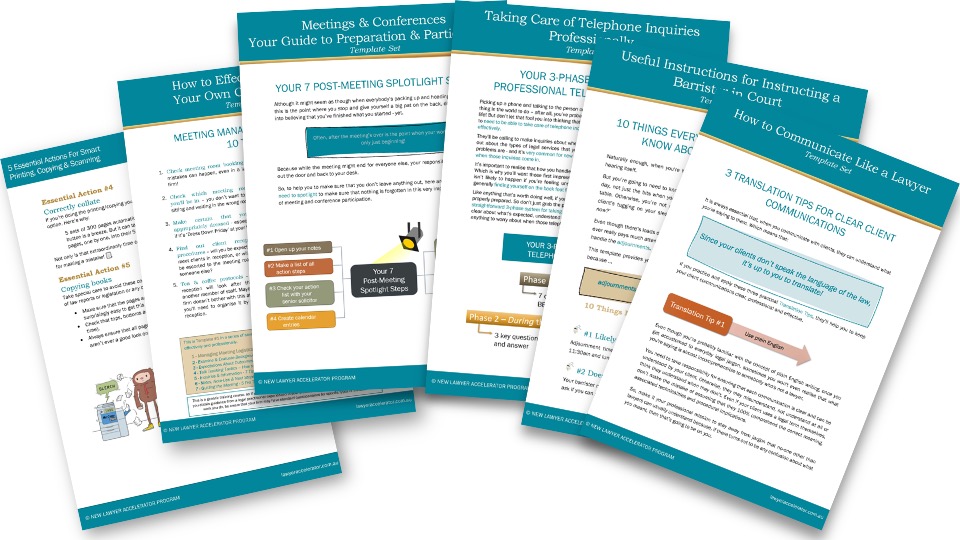
The New Lawyer Accelerator Program doesn’t stop with the video modules.
The video training is supplemented with additional resources to assist graduates to remember what they’ve learnt, apply skills in their own work, and reinforce the core elements of the training,
The key takeaways from each module are summarised in the Top Ten Tips handout as a quick and easy reference tool.
Even more than that, there’s a comprehensive collection of checklists, precedents, guides and summaries that cover the skills that they’ve learnt. Here are just a few examples from the 100+ downloadable templates that are included in the New Lawyer Accelerator Program:
Designed to provide ‘hands-on’ guidance, these practical printouts are in convenient formats, straightforward to understand and simple to follow. So that once new lawyers have completed a module, they’ll always have these to refer to, adapt and use in their own daily practice.
Top Ten Tips
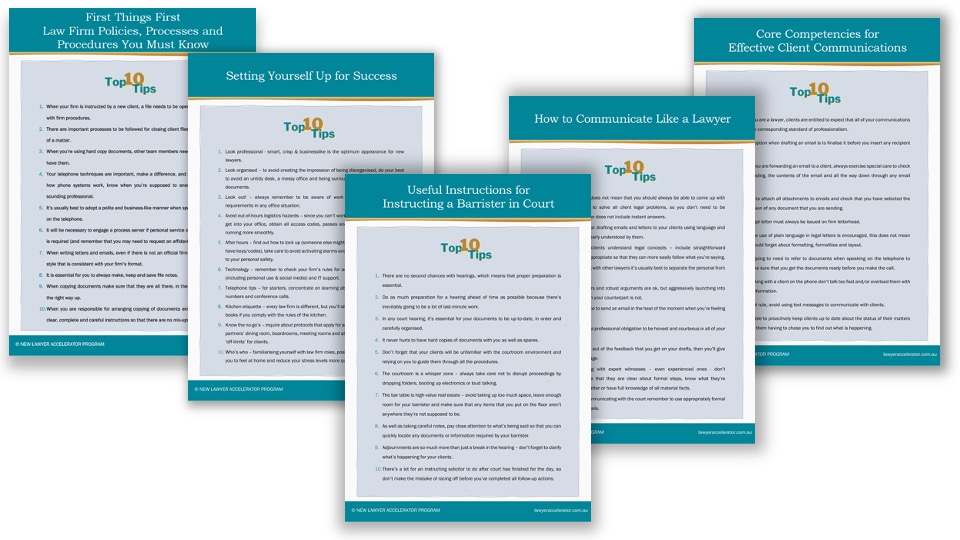
Since there’s a lot to cover in each module, an easy-to-find summary of some of the key elements of the training can be a helpful learning aid.
The Top Ten Tips draw together the main points from each training session so that new lawyers will have a ‘ready reference’ at their fingertips they you want to refresh their memory about what they’ve learnt.
By providing an overview of each topic, the Top Ten Tips are a useful supplement to the more detailed explanations that are included in the templates. They also have the benefit of allowing new lawyers to quickly identify which aspects of the training are of special interest or relate to a skill that they want to examine more closely.
Quick Quiz Challenge
Using a mix of 20 multiple choice and ‘true or false’ questions, the students will be able to reinforce what’s just been learnt and to test their knowledge of the topics covered.
 Instant results provide immediate evaluation, so that they can check straightaway that they’ve understood the skillset before moving onto the next module.
Instant results provide immediate evaluation, so that they can check straightaway that they’ve understood the skillset before moving onto the next module.
Why not try some of the program's Quick Quiz Questions yourself?
By submitting your name and email, you agree to receive emails informing about program news & updates as well as upcoming webinars.
Recommended Training Format
To gain the maximum benefit from the New Lawyer Accelerator Program, the recommended format is for your new lawyer to undertake training for one hour a day, right from day one, and then to immediately apply what they’ve learnt as they go.
But everybody’s different, and since the training is on-line & on-demand, it means that junior lawyers can work at their own preferred pace, anywhere, anytime.
There are 3 separate stages to the program. These phases have been structured to match the increasing level of complexity and responsibility of the work undertaken by a new graduate at three key stages:
Skills Level 1 – Start-up stage (10 training modules)
Skills Level 2 – 3-month stage (5 training modules)
Skills Level 3 – 6-month stage (5 training modules)
The advantage of splitting the training into these 3 phases is that new lawyers have the opportunity to:
- Learn the practical skills most relevant to their stage
- Apply what they’ve learnt
- Gain the benefit of some experience
- Lock in those skills
- Add to and build on their skills with more advanced training as they reach the next stage
While following the staged sequence to match the corresponding stage of learning curve is recommended, the program can be readily adapted to suit individual styles, allowing junior lawyers to work at their preferred pace, on demand, on-line.
Skills Level 1: Start-Up Stage
The Start-up Stage begins right from day one.
There are 10 modules filled with practical basic training especially selected for the first two weeks that a new lawyer joins your firm.
The Start-Up Stage training includes 3 components so that graduates will have everything they need to put them on their feet:
1. Induction
For someone fresh out of university, almost everything about a law firm is new, different and unknown. Such high levels of uncertainty can create a lot of stress, which impacts on learning, retention of information and performance. Familiarizing new graduates with matters like law firms processes & protocols, WH&S factors, how to maintain a professional workspace, legal letter layouts and telephone style instantly decreases their levels of distraction, thereby creating ideal conditions for lifting concentration and performance levels right from day one.
2. The business basics of being in a law firm
The commercial side of the practice of law is rarely something to which graduates have been exposed. Which means that, usually, new lawyers only have an extremely limited understanding of how a law firm functions as a business. The concept of a budget is unknown. The training puts legal practice into a business context that newcomers can understand and relate to, by showing them how the overall financial operations directly link into their daily work. It includes clear and simple explanations about billable hours, budgets and invoicing and instructions for how to correctly complete timesheets.
3. The first round of typical tasks undertaken by graduate lawyers
 New lawyers usually struggle quite a bit when they’re allocated their first tasks. Although their legal knowledge might be quite impressive, what’s missing is a solid base of practical skills. This can lead to a lot of guesswork, trial and error and mistakes. The start-up phase of the training puts in place the first layer of practical skills (which will be built upon and added to in the following two phases as work becomes increasingly complex).
New lawyers usually struggle quite a bit when they’re allocated their first tasks. Although their legal knowledge might be quite impressive, what’s missing is a solid base of practical skills. This can lead to a lot of guesswork, trial and error and mistakes. The start-up phase of the training puts in place the first layer of practical skills (which will be built upon and added to in the following two phases as work becomes increasingly complex).
It concentrates on the basics, like: handling telephone inquiries, preparing briefs, arranging conferences, file management and professional client communications. The start-up phase wraps up with an ‘everyday ethics’ training highlighting how ethical errors can strike down even junior lawyers anywhere, anytime, any day.
For an easy-to-read summary of topics covered in each module click here
Skills Level 2: 3-Month Stage
By the 3 months stage, new lawyers will have had the opportunity to settle into their role, implement the basic skills that they learnt in Phase 1 and to become more accustomed to handling entry level tasks.
Which means that they’ll be ready to move onto legal work that is somewhat more complex. Along with that, they’ll be expected to manage a larger file load and take on some additional responsibility for themselves.
While being continually confronted by things they haven’t done before is what being new is all about, a graduate’s productivity and proficiency can be vastly improved if they’re provided with structure in advance. That’s why Phase 2 of the training concentrates on the typical sorts of tasks that are allocated to new lawyers once they reach this next stage of their learning curve. Preparing for & taking part in meetings and conferences; professional communications with clients, colleagues and the court; how to progress their client files efficiently and effectively; accomplishing confident court appearances; proficiency in workload management – these topics are all broken down into easy-to-follow, step-by-step guides for new lawyers who are still finding their way.
And since they’ve got someone to show them what to do and how to do it, it means that, instead of becoming stressed, distracted or overwhelmed, their work automatically becomes less disrupted, flows more smoothly and their capacity to concentrate on the substantive issues is increased.
For an easy-to-read summary of topics covered in each module click here
Skills Level 3: 6-Month Stage
After 6 months in full-time legal practice, most graduates are gradually becoming more accustomed to the daily work of a junior lawyer. Since they’ve had an opportunity to undertake a range of tasks more than once, it means they’ve already got the benefit of learning from their own previous experience for a limited range of tasks.
 However, managing multiple files, increased levels of responsibility and greater complexity of tasks can leave many new lawyers struggling as they try to cope with these additional demands. The problem that they face is that they can no longer deal with their client files in the same way that they managed their university studies. The days of pre-set assignment topics, listening to lecturers and long-term due dates are gone forever, and graduates are often completely unprepared for what comes next.
However, managing multiple files, increased levels of responsibility and greater complexity of tasks can leave many new lawyers struggling as they try to cope with these additional demands. The problem that they face is that they can no longer deal with their client files in the same way that they managed their university studies. The days of pre-set assignment topics, listening to lecturers and long-term due dates are gone forever, and graduates are often completely unprepared for what comes next.
Skills Level 3 is designed to:
- assist graduates to step into a suitable level of autonomy in their matters (not too much, not too little);
- walk them through the process for how to effectively step up to take charge of their own client meetings (from straightforward logistics, to preparing an agenda, effective questioning techniques and follow-up);
- teach them essential skills for pro-active matter management (in-built planning for unpredictability, coordinating input, updating senior lawyers);
- show them the best way to guide and inform clients when instructing a barrister in court (as well as proper preparation, what to do at the bar table and final follow up);
- instruct them in how to avoid burnout as they adapt to the lawyer’s reality of constantly changing priorities, urgent deadlines and competing demands (including risks of rushing; failing to alert senior lawyers to problems; ignoring priorities)
Since any sense of uncertainty is a definite disadvantage, removing so many unknown factors in advance means that graduates can feel less intimidated, giving them a confidence boost that certainly won’t go unnoticed by your clients.


